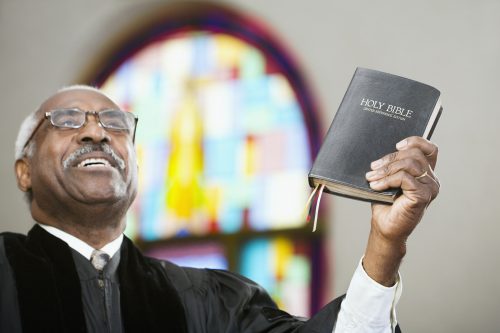The main responsibility of a pastor is feeding and caring for the sheep. Are modern-day pastors fulfilling all their duties?
Today we talk about the duties of a pastor. As we’ve already discovered a pastor is synonymous with a bishop, overseer, elder, shepherd or presbyter—the different labels all mean the same thing.
We also know that pastors were given by Christ with the end goal of equipping the saints to do work of ministry until we all come to the unity of the faith and of the knowledge of the Son of God (Eph 4:11-13).
Now I want to jump right into how they’re suppose to accomplish this. The old testament and the new both speak of pastors. God always had pastors for his people—for the Israelites then, and for the church now.
The main thing the pastor is responsible for is taking care of the sheep. If you don’t know the duties of an actual shepherd they’re quite similar for a shepherd of God’s people. Let’s start with the first task:
Feeding the sheep
And I will give you pastors according to mine heart, which shall feed you with knowledge and understanding (Jer 3:15). Take heed therefore unto yourselves, and to all the flock, over the which the Holy Ghost hath made you overseers, to feed the church of God, which he hath purchased with his own blood (Acts 20:28).
Pastors are to feed the sheep with knowledge and understanding. Knowledge includes practical, sound advice, but primarily, the wisdom of God—the raw and loving truth of God’s word applied individually on a practical level. Pastors are to show the sheep the way to live for Christ with the Bible as the foundation.
Alongside knowledge and wisdom is understanding. Proverbs 4:7 shows us that the two are different (and I’ve already covered a study on knowledge and understanding). Basically, understanding is the ability to perceive and discern a situation in order to apply wisdom and knowledge. So pastors are not only given the task of giving knowledge and wisdom, but helping the sheep to use it in everyday situations.
Caring for the sheep
Apart from feeding the sheep the word of God, caring for them is imperative and involves a whole lot more. In Ezekiel 34:4 God warns the pastors of his coming judgement because of their lack of care for his sheep. This portion of scripture gives us an indication of what God requires of his pastors:
The weak you have not strengthened, nor have you healed those who were sick, nor bound up the broken, nor brought back what was driven away, nor sought what was lost; but with force and cruelty you have ruled them (Ez 34:4 NKJV).
From the text, I get 5 ways of caring for the sheep; and I will cover what each involves:
- Strengthen the weak
- Heal the sick
- Bandage the wounded
- Go after the strays
- Seek the lost ones
Strengthen the weak
There are going to be weak saints in the fold. Their weakness may come from not being fed the true word of God, or perhaps they are newborn believers having had no experience with spiritual things. For whatever reason they’re weak, it’s the pastor’s duty to help them get strong and healthy (Acts 18:23).
This requires extra time with these particular ones, one-on-one bible teaching and encouragement, continual prayer and helping them to understand that Christ is their strength (Phil 4:13). This is not to say a pastor should just tell the weak sheep to believe that Christ is their strength, but to strengthen the believer with the word of God.
Heal the sick
Sheep get sick from time to time, physically and spiritually. In the false church system, it kind of bothered me that all the pastor could do when someone was sick was pray and visit them. And while I know that saints are sick for many reasons (sometimes in which God allows), the pastor should be able to simply heal the sick. After all, we’ve been given the power to heal through the Spirit of God (1 Cor 12:9). Not only that, it was common procedure to go to the pastor if you were sick:
Is any sick among you? let him call for the elders of the church; and let them pray over him, anointing him with oil in the name of the Lord: 15And the prayer of faith shall save [heal] the sick, and the Lord shall raise him up; and if he have committed sins, they shall be forgiven him. 16 Confess your faults one to another, and pray one for another, that ye may be healed. The effectual fervent prayer of a righteous man availeth much (James 5:14-16).
Some will take this passage to mean that saints only get sick because they’ve sinned, but in verse 15 it says “IF he have committed sins, they shall be forgiven him” letting us know that a saint can become ill apart from committing sin.
However, the text also suggests that one can be physically sick from participation in sin, which some would call a “spiritual sickness.” But nevertheless, this kind of sickness can be healed too through the confession of sin and the effectual fervent prayer of righteous men.
The bottom line is: there should be healing flowing in the church and pastors should be readily available to heal sicknesses in their flock through the power of God.
Bandage the wounded
This is different from healing the sick. In this case, the sheep had been beaten and broken by persecution and/or hard life experiences (abandonment, trauma, abuse, death in the family, etc.).
Many sheep who leave the false church come to other churches wounded and they need to be cared for. They need to be bandaged up having been freed them from witchcraft, manipulation and spiritual abuse.
A pastor has to be sensitive and sympathetic to these kinds of sheep and watch over their recovery. He will have to listen to their hurts and pains and administer “spiritual bandages” in the form of kindness, encouragement and the word of God.
Go after the strays
Some sheep begin to stray because of life’s circumstances, tempting false teachings by wolves in sheep clothing, and so on. It’s the pastor’s job to stay alert and watchful and move those sheep back into the fold with correction and love.
Seek the lost ones
Some sheep get lost on their own accord. In other words, they allow something to cause them to leave the church and it’s the pastor’s responsibility to do all he can to get them back in right fellowship with the Lord.
Brethren, if any of you do err from the truth, and one convert him; Let him know, that he which converteth the sinner from the error of his way shall save a soul from death, and shall hide a multitude of sins (James 5:19-20). Rescue others by snatching them from the flames of judgment. Show mercy to still others, but do so with great caution, hating the sins that contaminate their lives (Jude 1:23 NLT).
I’ve heard some pastors imply that they are “done” with those who leave the flock—not going after them or even calling them—but this isn’t how God treats us. When we stray, doesn’t God go after us? When we get hard-headed and walk away from the fellowship, isn’t God still there? He is. While God’s grace has a limit, his desire is that no man perish, but that all repent (2 Peter 3:9); and this is how pastor’s ought to be. Jesus said is plainly:
What man of you, having an hundred sheep, if he lose one of them, doth not leave the ninety and nine in the wilderness, and go after that which is lost, until he find it? (Luke 15:4)
So that’s what caring for the saints of God looks like, now let’s look at how it should be done.

Shepherding with gentleness and freedom
We see that there’s a LOT of responsibility in pastoring. I can imagine a pastor getting frustrated with the flock at times and this could lead to mistreatment.
The latter part of verse 4 of Ezekiel chapter 34 shows us that God doesn’t want pastors to rule with force (coercion or compulsion, especially with the use or threat of violence) and cruelty (behavior that causes pain or suffering to a person or animal). So, on the contrary, a pastor should rule with gentleness and freedom.
God doesn’t force, coerce, or manipulate us to do anything, likewise the pastor must be like God. An example of force is when the people aren’t giving financially to support the work and the pastor uses old testament scriptures on tithing—saying that God will allow something bad to happen to their finances, if they don’t give—this is manipulation. Instead, he should commit the matter to God knowing that God is in control and that it’s on God if the sheep aren’t giving financially.
An example of cruelty is when a pastor gets frustrated with the bad behavior of select sheep, decides to let his flesh run wild, verbally destroying all the offending parties and exposing their private matters to the rest of the congregation during a sermon—this is cruel. The words of a pastor are very powerful and can cause great pain if not delivered in the Spirit of God.
However, don’t get the bible twisted, God still commands his pastors to rebuke and correct those who are out of line, while this may cause pain (because the truth hurts), it must be done at the appropriate times and in the loving Spirit of God.
Keep watch at night
Dark times will come corporately and dark times for will come individually. It’s at these times when pastors must keep an even closer watch over the flock because the enemy always uses darkness to his advantage (Luke 2:8, John 10:11-12).
Pastors must stay on guard when a traumatic event happens in the life of a saint, or when periods of persecution are heavy because it’s at these times that sheep could stray and get lost.
With all that being said, a pastor has a huge responsibility, but we know that he doesn’t have to do this alone—he has other pastors by his side and of course the chef pastor, Jesus Christ to strengthen and guide him.
Next time, we’ll discuss the qualifications of a pastor and more.



